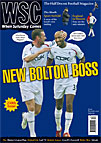 Blackburn Rovers have had little success in attracting non-white fans. But the recent Kick It Out anti-racism week was used to try to appeal to the town’s Asian community, as Bruce Wilkinson reports
Blackburn Rovers have had little success in attracting non-white fans. But the recent Kick It Out anti-racism week was used to try to appeal to the town’s Asian community, as Bruce Wilkinson reports
There was a time when it was extremely rare to see any black or Asian faces around Ewood Park, but thankfully this has slowly begun to change. The club are running a strong anti-racism campaign under the banner of Not Under Our Roof and have put together a number of events to coincide with the Kick It Out week. Youngsters attending Rovers’ education department created anti-racism posters prominently displayed in the programme for the game against Reading. Pupils from local schools paraded before the match waving Kick It Out banners, while a number of high-profile players, including Tugay and Jason Roberts, supported the week of action.
Chosen to pilot the Racial Equality Standard awarded by Kick It Out (along with Leeds United and Leicester City), Blackburn were recently presented with a certificate for reaching the preliminary level of the scheme. The standard requires clubs to look positively at equalities issues throughout all areas of operation, from recruiting young players to ensuring that there is adequate representation of ethnic minorities within the administration. The club’s website has a strong message supporting the principles of diversity and inclusion and a commitment to take further positive action. They have consulted representatives of local ethnic minority groups and other agencies and have begun to use this input to guide the policy of the organisation. There is now a hotline on which fans can report racist behaviour directly to the club.
An attempt to boost overall attendances by cutting ticket prices has been only a partial success. For a small-town club, squeezed on all sides by the partisan fans of other teams, it is imperative that everything is done to draw in as many locals as possible. On a pragmatic level it seems sensible to tap into a large available part of the population, most of which isn’t attending matches. Although the numbers of Asian fans going to Ewood Park is gradually increasing, it is still nothing like a representative proportion of the numbers living locally, roughly 25 per cent of the total population of 105,085 (Blackburn has the largest Muslim population of any UK town outside Greater London). There is a difference between stamping out racism in grounds and actively seeking to attract support from local ethnic minorities.
For all the positive noise coming from the club itself, there still seems to be little work being done on the ground to bring in support from ethnic communities. A much more sustained, forceful marketing campaign to try to get Asian supporters to attend matches is what is needed, rather than putting out positive messages with the hope that they will come.
To be fair to the club, the problem of integration within the town runs far deeper than the make‑up of Rovers’ support. Blackburn is one of a number of conurbations in the English north-west where a large Asian population has grown with little effort made by central or local government to bring the two communities together. There are parts of the borough where the only Asian faces you are likely to see are driving taxis, while in other districts it is rare to see a white person in the street. It is a place left riven by the industrial destruction of the Thatcher era, with one of the lowest per capita incomes in the country – the BNP have used the poverty and social division to make electoral headway. It is certainly too much to ask a football club to solve these kinds of social problems. There is, though, no reason why Rovers can’t play a positive role in bringing people together and in so doing help themselves to become even more competitive in the Premier League.
From WSC 250 December 2007